
 The University of Vermont Medical Center (UVM Medical Center) in Burlington, Vermont, has a long-standing and enduring commitment to patient- and family-centered care (PFCC) that spans many decades.
The University of Vermont Medical Center (UVM Medical Center) in Burlington, Vermont, has a long-standing and enduring commitment to patient- and family-centered care (PFCC) that spans many decades.
Early Foundations and Pioneering Efforts
UVM Medical Center’s journey in Patient- and Family-Centered Care (PFCC) began in the late 1980s, rooted in its Children’s Hospital. In collaboration with Parent to Parent of Vermont—a statewide advocacy organization for children with special health care needs—physician leaders helped establish one of the first family faculty programs in the United States. This groundbreaking initiative enabled medical students to participate in home visits with families of children facing complex health challenges. These firsthand experiences were then explored in classroom discussions, co-facilitated by physicians and family faculty, offering students invaluable insights into the lived realities of care.
This early recognition of the critical role families play in shaping effective care led to the creation of a Family Advisory Council for the Children’s Hospital—an enduring structure that continues to elevate family voices in clinical and organizational decision-making.
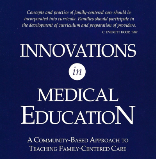 In the mid-1990s, the Institute for Family-Centered Care (now known as Institute for Patient- and Family-Centered Care [IPFCC]) partnered with the University of Vermont College of Medicine and Parent to Parent of Vermont to launch Innovations in Medical Education: A Community-Based Approach to Teaching Family-Centered Care. Supported by a grant from the U.S. Maternal and Child Health Bureau, this annual seminar ran for three years and became a national touchpoint for educating medical professionals from across the U.S. and Canada on the core principles of PFCC. It helped catalyze a broader movement toward integrating family perspectives into medical education and practice.
In the mid-1990s, the Institute for Family-Centered Care (now known as Institute for Patient- and Family-Centered Care [IPFCC]) partnered with the University of Vermont College of Medicine and Parent to Parent of Vermont to launch Innovations in Medical Education: A Community-Based Approach to Teaching Family-Centered Care. Supported by a grant from the U.S. Maternal and Child Health Bureau, this annual seminar ran for three years and became a national touchpoint for educating medical professionals from across the U.S. and Canada on the core principles of PFCC. It helped catalyze a broader movement toward integrating family perspectives into medical education and practice.
Strategic Leadership and Program Growth
In 2013, Amy Cohen, PhD—a visionary parent of a child with complex health needs—joined the University of Vermont Children’s Hospital Patient and Family Advisory Council (PFAC) and soon became its chair. Her leadership marked a pivotal moment in the evolution of Patient- and Family-Centered Care (PFCC) at UVM Medical Center.
At the recommendation of the PFCC steering committee, a ten-member team, including Family Advisors as well as UVMMC senior leadership, participated in an IPFCC Intensive Seminar. The team and PFCC steering committee collaboratively developed a multi-year strategic plan to advance PFCC across the medical center. Among their earliest and most impactful initiatives were the launch of a family-centered rounding project and contributions to the development of a multidisciplinary coordinated care clinic for children with Spina Bifida and related conditions.
Recognizing her leadership and deep commitment to PFCC, Amy Cohen was subsequently hired as the Patient- and Family-Centered Care Program Manager at the UVMMC Jeffords Institute for Quality. In this role, she assumed direct responsibility for implementing the strategic plan and expanding both the PFAC and the Patient/Family Advisor (PFA) program, further embedding the principles of partnership, empathy, and collaboration into the fabric of care delivery.
IPFCC's collaboration with the UVM Jeffords Institute for Quality continued beyond the early initiatives. In 2015, IPFCC was invited to plan the agenda and present at the organization's Quality Symposium. Then, in 2017, IPFCC planned and facilitated an impactful two-day seminar, sponsored by the Jeffords Institute for Quality, for over 250 leaders, staff, clinicians, and patient and family advisors from the Medical Center and the entire UVM Health Network. During this seminar, participating teams actively created their own PFCC action plans.
Evolving Commitment and Current Structure: UVM Medical Center's commitment extends to practical policies, as demonstrated by its dedication to creating a welcoming policy that actively supports family presence and participation, in direct contrast to more restrictive visiting policies. This key policy was reaffirmed after the COVID pandemic, underscoring its importance.
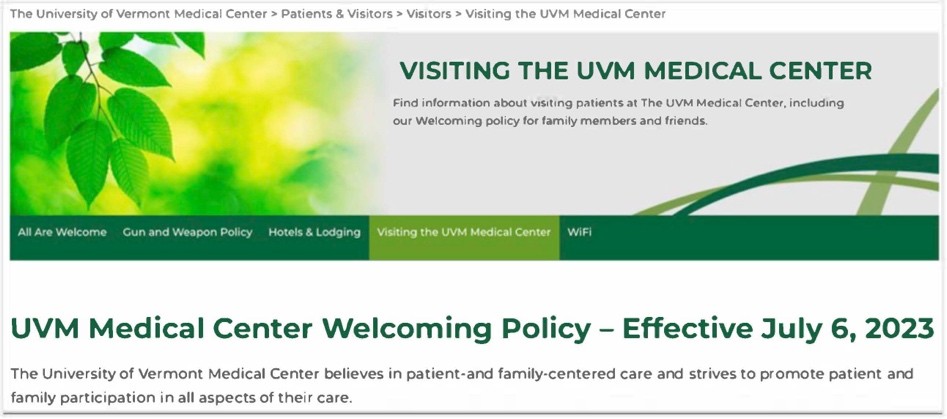
Time shifts people’s roles in life and work. And, as everywhere, programmatic oversight has changed hands at UVMMC. In 2022, Vicki Mascareño Nelson, a Patient Family Advisor on the UVMCH Children’s PFAC, joined the PFCC Team as an employee to coordinate and facilitate the UVMCH PFAC. A year and a half later, Vicki was asked to shift her role to include full-time oversight for both the Children’s Hospital and University of the Vermont Medical Center Patient and Family-Centered Care Programs. She brings the experience of being a Patient Family Advisor, parent, and a patient as well as a strong connection with community services and agencies to her PFCC leadership. Her insights and recommendations for "Building and Evolving PFACs: Eight Lessons Learned" were published as a blog on the Beryl Institute’s website in 2025.
The current organizational framework for PFCC at UVM Medical Center includes multiple Patient and Family Advisory Councils (PFACs). These councils are connected and supported by a PFAC Steering Committee, which is essential for ensuring continuous improvement in partnerships with patients and families. The Steering Committee serves as a vital bridge, facilitating coordination and cooperation between the individual PFACs and the organization’s leadership. Its responsibilities include providing guidance, allocating resources, removing barriers, and ensuring that the work of the councils achieves a meaningful impact.
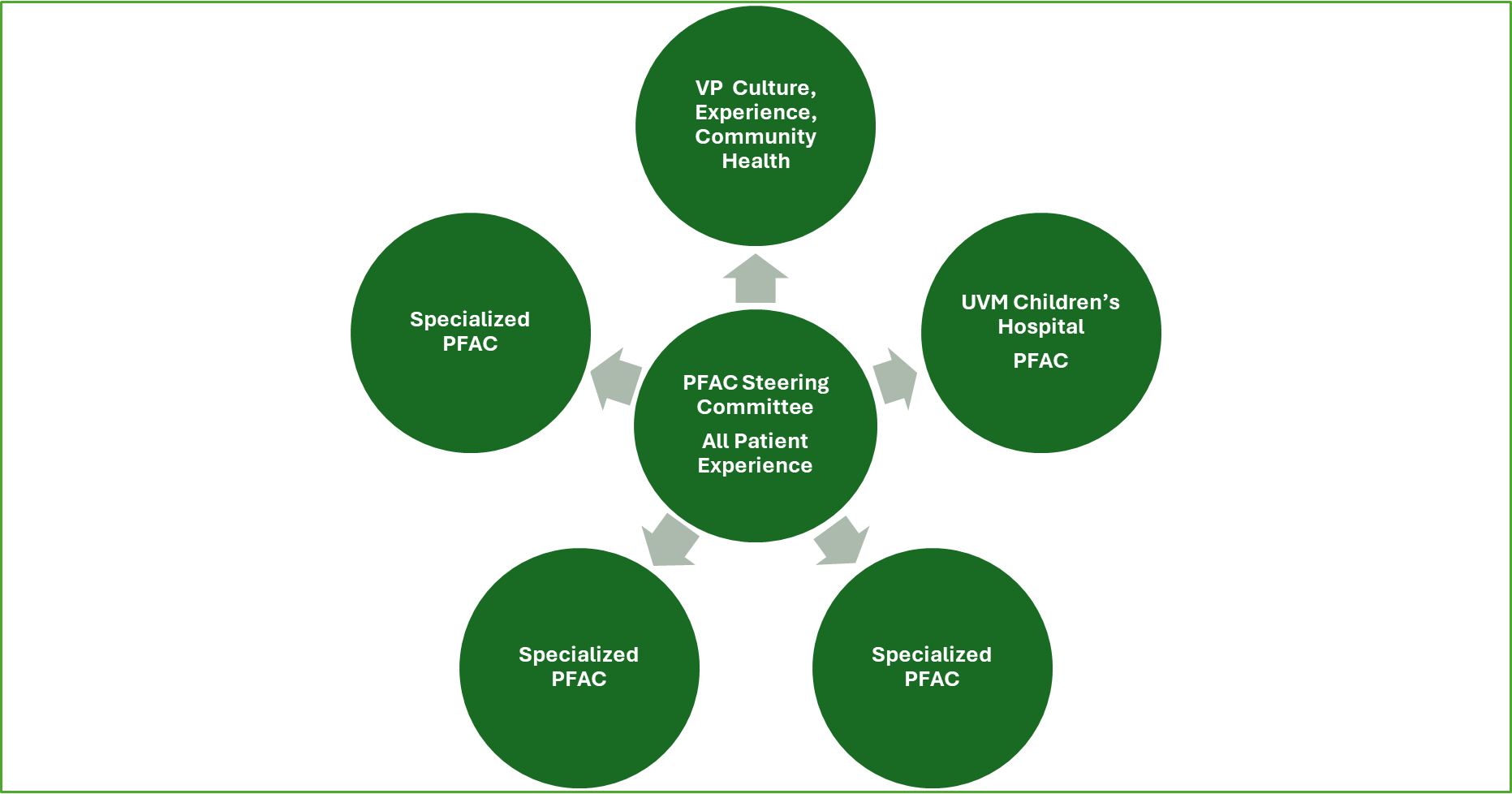
Furthermore, UVM Medical Center utilizes visual tools to effectively communicate PFCC core concepts and the roles of patient family advisors in orientation and ongoing education sessions for staff, leaders, and advisors.
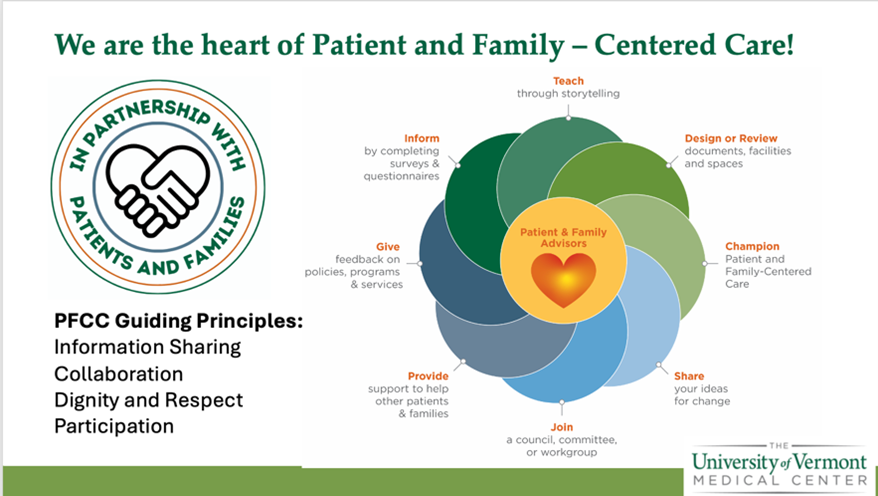
These visuals also clearly illustrate the placement of PFACs within the organizational structure and their direct links to quality improvement initiatives.
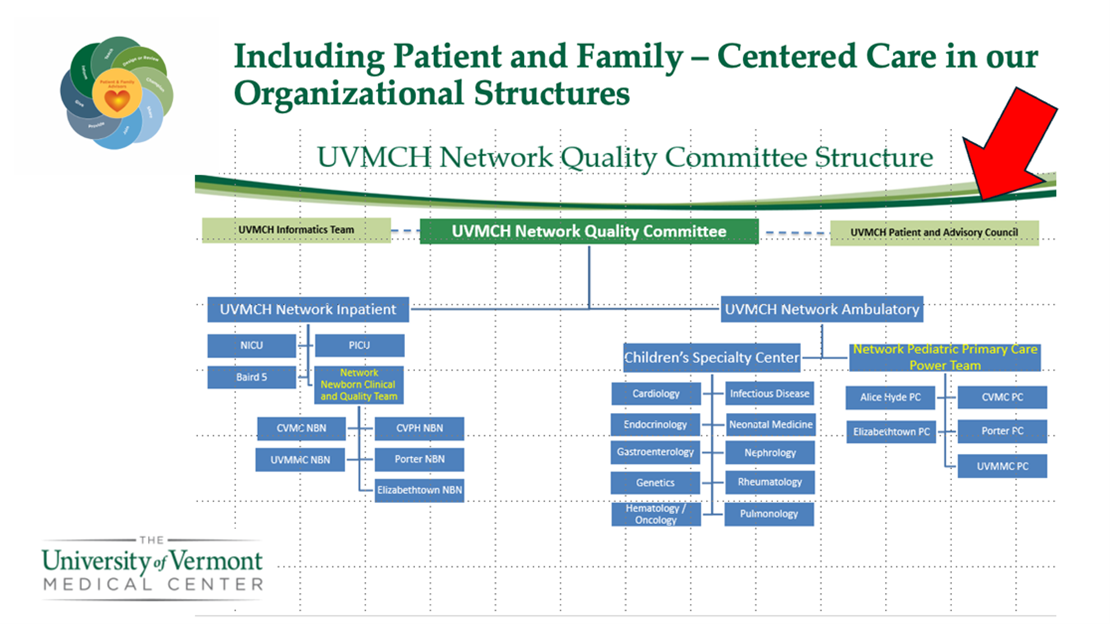
The specific priority issues currently being addressed by the PFACs for the UVM Medical Center and the Children’s Hospital are:
- Planning Grand Rounds (i.e., The Power of Partnership in Local Care)
- QI project: Pediatric Blood Draw/lab guide for families
- Coordinating parent support events with community partners
- Developing resources aimed at youth transitioning to adulthood
- Assessing multilingual and multicultural community needs (i.e., updating AVS—after visit summary translations)
- Coordinating PFAC projects with the UVMMC strategic plan
- Focusing on and prioritizing quality and safety initiatives
- Creating a system to develop more specialized Patient and Family Advisory Councils